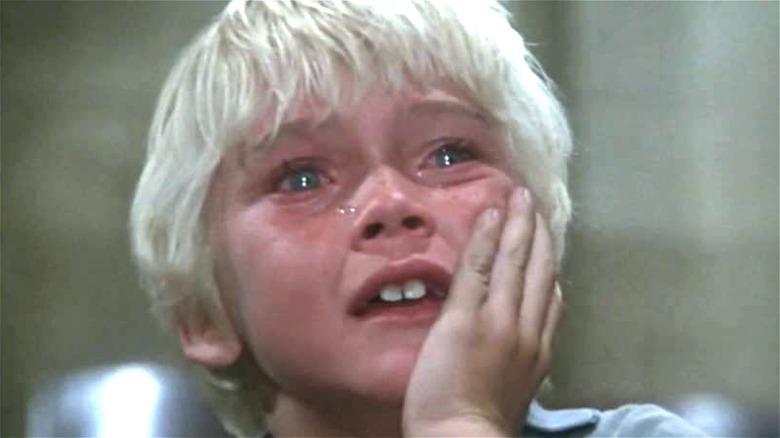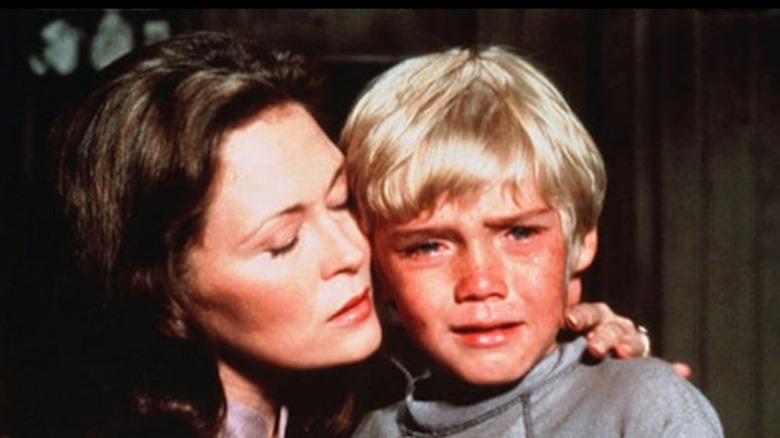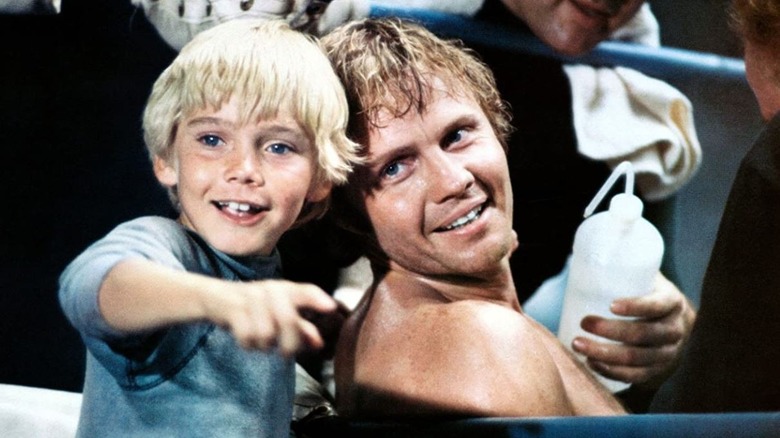The Saddest Movie Ever According To Science
Very few people might like sadness as a concept, but there's no denying that there's a time and place for sitting down to watch a sad movie. However, exactly what constitutes a sad movie, and how it can be experienced is a more difficult thing to figure out. Some people have ugly-cried in a theater, others tear up watching a movie at home, and others still find themselves chopping onions at the mere memory of a sad scene they watched years ago.
We all have those certain movies that just tug on our heartstrings. Some prime examples include the horrifically depressing ending in "Million Dollar Baby," the haunting journey portrayed in "The Pianist," and the gut-wrenching conclusion to "The Green Mile." Each movie works in different ways to make the audience weep for the characters, and all are critically acclaimed for their success in evoking such sadness.
Thanks to the large variety of things people convey as sad, and the vast array of films that depict said things, you could say that the list of sad movies is nearly endless. As such, if you were to ask someone what the saddest movie of all time is, they would probably only be able to give you a subjective answer ... that is, unless you ask the right people. See, while it's easy to assume that it's pretty much impossible to narrow down what the saddest movie of all time is, Smithsonian Magazine's Richard Chin spotlights an astounding scientific study by psychology researchers Robert Levenson and James Gross, who have apparently succeeded in doing just that. Without further ado, let's take a look at the saddest movie ever, according to science.
The Champ might not be very good, but it's definitely sad
Working at the University of California, Berkeley, back in 1988, Robert Levenson and James Gross were researching the relationship between movie scenes and emotion. Specifically, they were searching for a scene that succeeded in eliciting only a single emotion at a time, Smithsonian Magazine reports. On the sadness front, the winner was as clear as it was surprising.
After testing 78 carefully vetted sad movie scenes across almost 500 undergraduate volunteers, they discovered that the ending scene in Franco Zeffirelli's 1979 sports drama "The Champ" was distilled sadness, and evoked the emotion more often than any other scene. To put this in context, the second place went to the famous scene in "Bambi" where the titular character's mother dies.
Since the results of the research were published in 1995, "The Champ" has been used in a great many psychology experiments and features in over 300 papers, thanks to the scene's ability to cause sadness in test subjects in a powerful, yet comparatively ethical way. "It's wonderful for our purposes," Levenson said. "The theme of irrevocable loss, it's all compressed into that two or three minutes."
Curiously enough, despite its off-the-charts emotional punch, critics don't consider "The Champ" a particularly great movie. It only has a 36 percent Tomatometer score on Rotten Tomatoes, so while scientists may be convinced of its importance, perhaps being a sad movie doesn't make it a good movie. Then again, its audience score is a respectable 82 percent, so maybe critics just don't like feeling sad.
What makes The Champ such a sad movie?
Knowing what "The Champ" is about, it's easy to understand why the movie is custom made to put your feelings through the wringer. The movie follows Billy "Champ" Flynn (Jon Voight), an aging boxer who's struggling to be a good father for his adorable son, T.J. (Ricky Schroder), while the boy's estranged mother (Faye Dunaway) attempts to pry the kid away from his loser dad.
All three, plus one horse, proceed to go through the wringer throughout the movie's duration. In the scientifically ultra-sad final scene, Billy dies in the aftermath of his desperate comeback match, in plain view of the distraught T.J. who slowly realizes that his father is dead. The heart-rending, nearly three-minute scene consists pretty much entirely of T.J. uncontrollably crying over his father's earthly remains.
Pretty sad, right? What's more, the movie has plenty of star power in Voight and Dunaway, and young Schroder actually won a Golden Globe for his role as the emotive T.J. As such, you can be sure that all those sad scenes and dramatic beats get driven home with five-star ability. The end result is so extremely sad that, per Smithsonian Magazine, even the scientists in charge of the experiment weren't immune to its power. "I still feel sad when I see that boy crying his heart out," James Gross has admitted.


